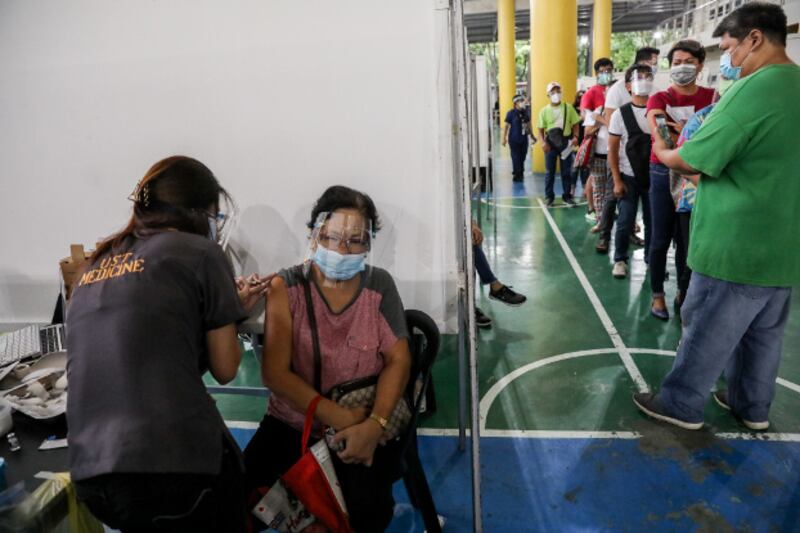Health experts on Wednesday recommended a “circuit-breaker” lockdown in the Philippine capital and its suburbs to cut off a possible surge of infections from the coronavirus’s highly contagious Delta strain.
The Philippines has detected relatively few cases of this variant so far, but experts with the OCTA Research Group warned that the country could go the way of neighboring Indonesia, which is reeling from an explosion of infections and deaths driven by the Delta strain.
“To this end, OCTA is suggesting an early circuit-breaker lockdown augmented by expanded testing, tracing, and isolation for two weeks in the NCR [National Capital Region],” the group said.
The capital region, or Metropolitan Manila, is home to some 14 million people and encompasses Manila and 15 suburban areas.
A circuit-breaker, or hard lockdown, refers to the use of a short, ultra-strict lockdown aimed at reducing coronavirus transmissions sharply. The term was named after devices used to shut off electrical circuits when too much current is flowing.
A “general community quarantine with heightened restrictions” imposed in the capital as well as surrounding suburbs “will not be enough to reverse the alarming trends,” the group warned. If implemented, the circuit-breaker would be the first of its kind in the Philippines.
The Delta strain, which was detected in India, likely is pushing up COVID-19 infections in the sprawling capital region, said OCTA Research. The group consists of scientists and experts who advise the local government in Manila.
On Wednesday, the Philippine health department recorded 84 new coronavirus fatalities, bringing the nationwide death toll from the outbreak to 27,401. To date, the department has confirmed 119 Delta cases nationwide.
Indonesia, Southeast Asia’s most populous nation, has recorded nearly 3.3 million infections and nearly 89,000 deaths since the pandemic began in early 2020.
In the Philippines, the Duterte administration has established general community quarantines with curfews in some areas, but allowed restaurants, shops and other businesses to stay partly open. In some areas, children have been allowed out of homes, but only in open public spaces.
Speaking on a local radio station, Interior Secretary Eduardo Año said the government was considering the recommendations by OCTA Research.
“We cannot afford to be in denial about Delta and we need to be ready,” he said. “We need to get ready and we need to assume that there are already local transmissions of the Delta variant.”
Still, the government needs to look at the effects of another round of strict lockdowns on the economy, he said, noting many Filipinos were only now beginning to return to work.
Meanwhile on Wednesday, the Philippine Chamber of Commerce and Industry said it would not endorse a stricter lockdown.
Edgardo Lacson, the chamber’s acting president, said a “knee-jerk reaction … will be disastrous to the economy which is already reeling from losses arising from months of lockdowns.
“Such a decision will cause the loss of hundreds of thousands of jobs again, not to mention business losses of enterprises, which our citizens can ill afford,” Lacson said.
The chamber called on the government to accelerate vaccination efforts and to allow those fully vaccinated to travel throughout the country and go to restaurants and malls freely.

‘Accelerates in an explosive fashion’
OCTA Research fellow Father Nicanor Austriaco said a hard lockdown would be used to “avert a possible catastrophic surge” in COVID-19 because of the Delta variant.
Based on the variant striking Thailand, Malaysia and Vietnam, projections show that a surge is expected to begin affecting Metro Manila’s health-care system by August, he said.
“Once a Delta-surge begins, it accelerates in an explosive fashion,” Austriaco, a molecular biologist, said in a virtual news conference.
“No country in ASEAN has been able to halt and reverse a Delta-surge without a hard lockdown of major cities,” he said, referring to the Association of Southeast Asian Nations.
Citing a recent study in China, Austriaco said the Delta variant viral load was 1,000 times greater than the original COVID-19 variant first detected in the Chinese city of Wuhan.
A person infected with the Delta variant can infect five to eight people, he noted. By contrast, a person infected with the original variant can infect two to three people.
Guido David, another OCTA Research fellow, said Manila remains “one of the high-risk areas” susceptible to new infections.
Other areas where the reproductive level of cases is “very high” include the cities of Davao and Cagayan de Oro in the south; Laoag city in the north; and Bacoor outside of Manila.
“Let us also learn from the lessons of other countries hit by Delta, where governments lost effective control of the epidemic because institutions in charge of managing the pandemic acted too little and too late,” David said.
Meanwhile, human rights groups have noted that many Filipinos want to be vaccinated but deliveries of the shots have been slow.
The Philippines is aiming to vaccinate 70 percent of its 105 million people by the end of this year. So far, only 6.8 million Filipinos have been fully vaccinated, according to the National Task Force on COVID-19.
Froilan Gallardo and Richel V. Umel contributed to this report from Cagayan de Oro, Philippines.
